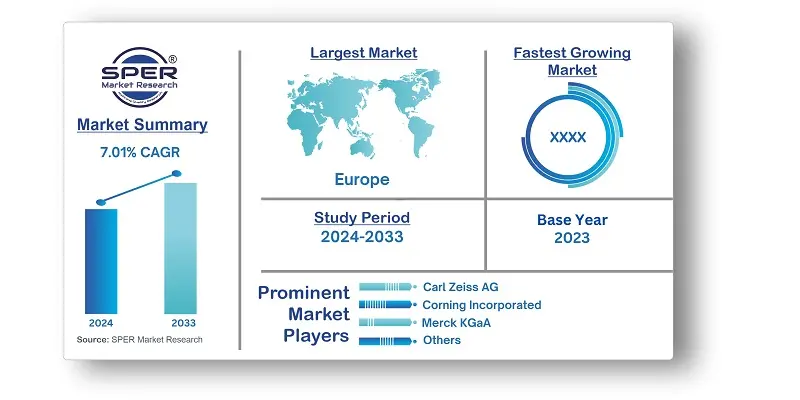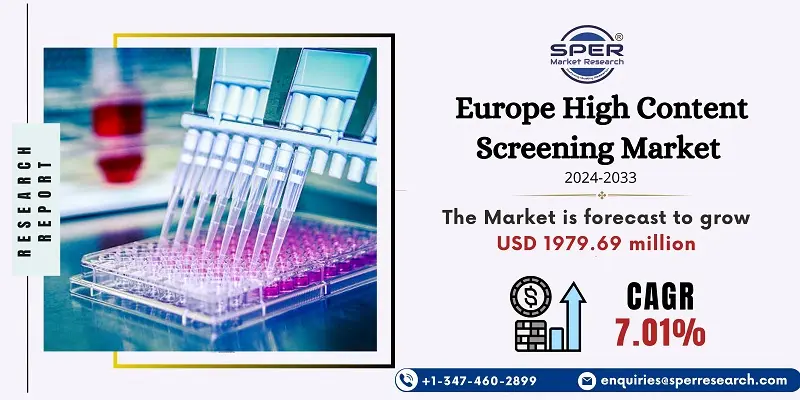
Europe High Content Screening Market Growth, Size, Trends, Demand, Share and Future Outlook
Europe High Content Screening Market Size- By Product Type, By Application, By Technology, By Distribution Channel- Regional outlook, Competitive Strategies and Segment Forecast to 2033
| Published: Aug-2024 | Report ID: HLCA2468 | Pages: 1 - 158 | Formats*: |
| Category : Healthcare | |||
- January 2023; Axion BioSystems declared the expansion of the Omni Star 12 to the Omni live-cell imaging item family. The new stage, in which elements coordinated advanced mechanics and different plans viable with any standard hatchery, offers upgraded adaptability and proficiency to researchers and medication designers leading live-cell imaging tests. This headway in the imaging strategy would assist with tranquilizing disclosure and be effective by having live cell imaging tests.
- December 2019; Olympus reported the U.S. send-off of the scanR HCS station, a cell imaging arrangement that uses Man-made reasoning (simulated intelligence) to empower cutting-edge natural examination. It joins the measured quality and adaptability of a magnifying lens-based arrangement with the robotization, speed, throughput, and reproducibility of an HCS station.


| Report Metric | Details |
| Market size available for years | 2020-2033 |
| Base year considered | 2023 |
| Forecast period | 2024-2033 |
| Segments covered | By Product Type, By Technology, By Application, By Distribution Channel |
| Regions covered | Germany, France, U.K., Italy, Spain, Russia, Turkey, Belgium, Denmark, Netherlands, Switzerland, Sweden, Poland, Norway, Finland, and Rest of Europe |
| Companies Covered | Axxam S.p.A., BD, Carl Zeiss AG, Corning Incorporated, Merck KGaA, Molecular Devices, LLC. (Subsidiary of Danaher Corporation), PerkinElmer Inc., Sartorius AG, Thermo Fisher Scientific Inc., and Zifo RnD Solutions. |
- Pharmaceutical Companies
- Biotechnology Firms
- Academic and Research Institutions
- Contract Research Organizations (CROs)
- Diagnostic Companies
- Government and Public Health Agencies
| By Product Type: |
|
| By Application: |
|
| By Technology: |
|
| By Distribution Channel: |
|
- Europe High Content Screening Market Size (FY’2024-FY’2033)
- Overview of Europe High Content Screening Market
- Segmentation of Europe High Content Screening Market by Product Type (Instruments, Consumables, Software, Services, Accessories)
- Segmentation of Europe High Content Screening Market by Application (Primary and Secondary Screening, Target Identification & Validation, Toxicity Studies, Compound Profiling, Others)
- Segmentation of Europe High Content Screening Market by Technology (G Microscopy, Flow Cytometry, Extracellular Matrix Based Scaffold, Western Blotting, ELISA, Immunohistochemistry, Others)
- Segmentation of Europe High Content Screening Market by Distribution Channel (Direct Tenders, Retail Sales)
- Statistical Snap of Europe High Content Screening Market
- Expansion Analysis of Europe High Content Screening Market
- Problems and Obstacles in Europe High Content Screening Market
- Competitive Landscape in the Europe High Content Screening Market
- Impact of COVID-19 and Demonetization on Europe High Content Screening Market
- Details on Current Investment in Europe High Content Screening Market
- Competitive Analysis of Europe High Content Screening Market
- Prominent Players in the Europe High Content Screening Market
- SWOT Analysis of Europe High Content Screening Market
- Europe High Content Screening Market Future Outlook and Projections (FY’2024-FY’2033)
- Recommendations from Analyst
1.1. Scope of the report1.2. Market segment analysis
2.1. Research data source2.1.1. Secondary Data2.1.2. Primary Data2.1.3. SPER’s internal database2.1.4. Premium insight from KOL’s2.2. Market size estimation2.2.1. Top-down and Bottom-up approach2.3. Data triangulation
4.1. Driver, Restraint, Opportunity, and Challenges analysis4.1.1. Drivers4.1.2. Restraints4.1.3. Opportunities4.1.4. Challenges4.2. COVID-19 Impacts of the Europe High Content Screening Market
5.1. SWOT Analysis5.1.1. Strengths5.1.2. Weaknesses5.1.3. Opportunities5.1.4. Threats5.2. PESTEL Analysis5.2.1. Political Landscape5.2.2. Economic Landscape5.2.3. Social Landscape5.2.4. Technological Landscape5.2.5. Environmental Landscape5.2.6. Legal Landscape5.3. PORTER’s Five Forces5.3.1. Bargaining power of suppliers5.3.2. Bargaining power of buyers5.3.3. Threat of Substitute5.3.4. Threat of new entrant5.3.5. Competitive rivalry5.4. Heat Map Analysis
6.1. Europe High Content Screening Market Manufacturing Base Distribution, Sales Area, Product Type6.2. Mergers & Acquisitions, Partnerships, Product Launch, and Collaboration in Europe High Content Screening Market
7.1. Europe High Content Screening Market Size, Share and Forecast, By Product Type, 2020-20267.2. Europe High Content Screening Market Size, Share and Forecast, By Product Type, 2027-20337.3. Instruments7.4. Consumables7.5. Software7.6. Services7.7. Accessories
8.1. Europe High Content Screening Market Size, Share and Forecast, By Application, 2020-20268.2. Europe High Content Screening Market Size, Share and Forecast, By Application, 2027-20338.3. Primary and Secondary Screening8.4. Target Identification & Validation8.5. Toxicity Studies8.6. Compound Profiling8.7. Others
9.1. Europe High Content Screening Market Size, Share and Forecast, By Technology, 2020-20269.2. Europe High Content Screening Market Size, Share and Forecast, By Technology, 2027-20339.3. Microscopy9.4. Flow Cytometry9.5. Extracellular Matrix Based Scaffold9.6. Western Blotting9.7. ELISA9.8. Immunohistochemistry9.9. Others
10.1. Europe High Content Screening Market Size, Share and Forecast, Distribution Channel, 2020-202610.2. Europe High Content Screening Market Size, Share and Forecast, By Distribution Channel, 2027-203310.3. Direct Tenders10.4. Retail Sales
11.1. Europe High Content Screening Market Size and Market Share
12.1. Europe High Content Screening Market Size and Market Share By Region (2020-2026)12.2. Europe High Content Screening Market Size and Market Share By Region (2027-2033)12.3. Germany12.4. France12.5. U.K.12.6. Italy12.7. Spain12.8. Russia12.9. Turkey12.10. Belgium12.11. Denmark12.12. Netherlands12.13. Switzerland12.14. Sweden12.15. Poland12.16. Norway12.17. Finland12.18. Rest of Europe
13.1. Axxam S.p.A.13.1.1. Company details13.1.2. Financial outlook13.1.3. Product summary13.1.4. Recent developments13.2. BD13.2.1. Company details13.2.2. Financial outlook13.2.3. Product summary13.2.4. Recent developments13.3. Carl Zeiss AG13.3.1. Company details13.3.2. Financial outlook13.3.3. Product summary13.3.4. Recent developments13.4. Corning Incorporated13.4.1. Company details13.4.2. Financial outlook13.4.3. Product summary13.4.4. Recent developments13.5. Merck KGaA13.5.1. Company details13.5.2. Financial outlook13.5.3. Product summary13.5.4. Recent developments13.6. Molecular Devices LLC. (Subsidiary of Danaher Corporation)13.6.1. Company details13.6.2. Financial outlook13.6.3. Product summary13.6.4. Recent developments13.7. PerkinElmer Inc.13.7.1. Company details13.7.2. Financial outlook13.7.3. Product summary13.7.4. Recent developments13.8. Sartorius AG13.8.1. Company details13.8.2. Financial outlook13.8.3. Product summary13.8.4. Recent developments13.9. Thermo Fisher Scientific Inc.13.9.1. Company details13.9.2. Financial outlook13.9.3. Product summary13.9.4. Recent developments13.10. Zifo RnD Solutions13.10.1. Company details13.10.2. Financial outlook13.10.3. Product summary13.10.4. Recent developments
SPER Market Research’s methodology uses great emphasis on primary research to ensure that the market intelligence insights are up to date, reliable and accurate. Primary interviews are done with players involved in each phase of a supply chain to analyze the market forecasting. The secondary research method is used to help you fully understand how the future markets and the spending patterns look likes.
The report is based on in-depth qualitative and quantitative analysis of the Product Market. The quantitative analysis involves the application of various projection and sampling techniques. The qualitative analysis involves primary interviews, surveys, and vendor briefings. The data gathered as a result of these processes are validated through experts opinion. Our research methodology entails an ideal mixture of primary and secondary initiatives.



Frequently Asked Questions About This Report
PLACE AN ORDER
Year End Discount
Sample Report
Pre-Purchase Inquiry
NEED CUSTOMIZATION?
Request CustomizationCALL OR EMAIL US
100% Secure Payment






Related Reports
Our Global Clients
Our data-driven insights have influenced the strategy of 200+ reputed companies across the globe.






















